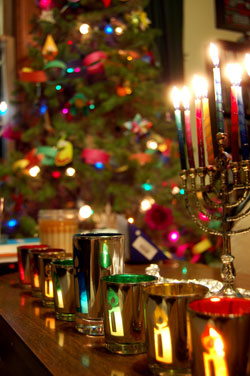This article originally appeared on www.InterfaithFamily.com and is reprinted with permission. For more resources designed for interfaith families exploring Jewish life, visit www.InterfaithFamily.com.

Okay, so you are intermarried, and have to deal with both Christmas and Hanukkah. What to do? According to experts who have written for InterfaithFamily.com, a free Internet magazine for intermarried families, here are some tips. This document is also available in an easy-to-distribute PDF format.
1. If you are raising Jewish children and don’t know what to do about Christmas (or if you are raising Christian children and don’t know what to do about Hanukkah), our experts say that it is okay to participate in the holiday as a way of respecting the non-Jewish (or Jewish) spouse and family. You can tell your kids, “Today we’re going to Grandma’s house for Christmas because that is Daddy’s (or Mommy’s) holiday. We’ll help him and his family celebrate, just as he helps us celebrate Hanukkah.”
2. Keep the focus on the children’s needs. What kids most love about Christmas is not the presents but the family togetherness. You don’t need to focus on the gifts; it is having the family all together which will make it most meaningful for your children. And help children understand that they can enjoy Christmas and Hanukkah activities without betraying either parent or their religious upbringing. At the same time, use holidays to reinforce children’s religious identity.
3. If you are raising Jewish kids and they feel uncomfortable about singing Christmas carols in school, should you complain to the school or reassure your kids? Our experts say you can do both. You might speak with the principal of the school about broadening the holiday song repertoire to include singing Hanukkah songs. That way, your child would be singing both Christmas and Hanukkah songs, as would the other kids. You can also reassure your children that singing the Christmas holiday songs doesn’t make them Christian, nor does enjoying those songs. It is okay to enjoy other people’s holidays, as long as your kids are clear what their holidays are.
4. Should you tell your in-laws that they shouldn’t give your children Christmas stockings or presents (if you are raising them Jewish) or Hanukkah presents (if you are raising them Christian)? That is up to you. Some parents ask the grandparents to give gifts wrapped in paper that indicates the holiday the children do celebrate, and that includes all the relevant paraphernalia. There is no right answer for everyone. Do what works for you and your family.
5. If your children want a Christmas tree in your home and your Jewish spouse refuses, how should you handle it? Perhaps you had an agreement to celebrate Christmas at the grandparents’ home, but now your kids (and you) want to celebrate in the home. Situations do change over time. Perhaps it is time for you and your partner to sit down for a talk. It would be important for each of you to explain what the holiday means to you. Share memories of when you were a child, how your grandparents celebrated with you, and what about those memories and traditions make them meaningful for you. Be clear about what the underlying issues are. Is it your own reluctance to have a Christmas tree or menorah in your home, or your fear about how your relatives might react?
6. Remember, the main concern is to decide how your family will live religiously throughout the year, not just for the month of December. If you agree about how you will live the rest of the year, then giving in on this holiday is less significant.
7. Allow your initial decisions to change as you and your family evolve. Certain things that may have seemed important at one stage of your marriage may become less important later. But pay attention to your inner feelings, to whether or not you feel comfortable with the practices your family evolves.
8. Work as partners to develop new family traditions while recognizing each partner’s needs and work out ways to meet them. Denying a need will breed resentment, whereas negotiating a mutually acceptable way to meet it will validate what is most important to your partner, strengthening your relationship. Creating ways to celebrate aspects of the holidays in your home, in your own style, unites the family.
9. If you are in a relatively new blended family, keep in mind that it is most important for your children to have a sense of continuity and of cherished traditions being preserved, despite the split-up of their original family. Therefore, you and your new husband may each want to maintain certain traditions with your own children, rather than do everything together at this time.
10. If you are in a blended family, your own children may not want to visit the parents of their new step-mother or step-father for Christmas or Hanukkah, especially if this is not a holiday they have celebrated. If that is the case, it is probably not a good idea to force them. And if you are celebrating a holiday in your home that is new for your step-children, expect that the holiday may be awkward and uncomfortable for the first few years, until it becomes a tradition of your new family. Understand that they may even feel as if they are betraying the religion they have been raised in. Respecting their boundaries may mean inviting them but not forcing them to participate.






